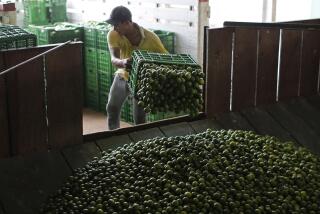‘Under the Table, Secretly, They Have All Paid’ : Salvador Rebels Tax Coffee Farms
- Share via
SAN MIGUEL, El Salvador — The leftist guerrillas who appeared at Filadelfo Baires’ coffee farm on the lower slopes of San Miguel Volcano presented what they said was a tax statement.
“Fraternal greetings in the name of the Armed Forces of Liberation,” the hand-lettered note said. “We ask that you collaborate with 20 pairs of boots, 20 pairs of trousers (blue jeans) and 20 shirts. Your attitude will be taken into account after the triumph; our people and the revolution will be thankful to you.
” . . . If you refuse to collaborate, we will take measures against your coffee farm.”
The note from the Armed Forces of Liberation, one of five groups fighting to overthrow the U.S.-backed government of President Jose Napoleon Duarte, was one of many that have been presented to Salvadoran coffee growers in a widespread effort to collect a “war tax.” The guerrillas have apparently enjoyed considerable success, demonstrating in yet another way that many Salvadorans must serve two conflicting authorities.
Baires, 70, is one of the few coffee growers in El Salvador who will admit to paying the guerrilla tax. He said in an interview that hardly any growers have dared not to pay, at least here in the San Miguel area of eastern El Salvador.
“Under the table, secretly, they all have paid,” Baires said.
Other growers, he said, do not like to talk about it because “they are afraid of being accused of collaborating” with the guerrillas.
In other areas, the guerrillas have stopped trucks carrying coffee harvested by growers who refused to pay the tax.
“They break the sacks open on the road and drive the truck back and forth over the coffee to ruin it,” Baires said.
He said that he paid the equivalent of about $125 in cash to the guerrillas. He said he knows other growers who have paid up to $750.
Baires said that he and most other growers in the area have ignored a separate guerrilla demand for an increase in the wages of their coffee pickers.
Jorge Villacorta, a spokesman for the Salvadoran guerrillas, said by telephone from Costa Rica that the so-called war tax varies according to the size of a grower’s harvest and other factors.
“It is negotiable, and it is negotiated directly with the coffee growers,” Villacorta said, adding that he could not estimate how much money the guerrillas have raised with their coffee tax.
Francisco Garcia Rossi, president of the Salvadoran Coffee Growers Assn., confirmed that many growers have paid the guerrillas’ tax. He said that collection of the tax has been “generalized” in eastern El Salvador and that it is sporadic in the west. He refused to give the names of growers who he says have paid the tax.
Guerrillas operate extensively in the east, which produces 20% of the country’s coffee, El Salvador’s main export crop. There is relatively little guerrilla activity in the west.
The richest coffee lands are in San Miguel province, on the gentle slopes of San Miguel Volcano. Baires, who lives in the nearby city of San Miguel, has two farms on the volcano, La Delfina and La Gloria.
He said the first note from the guerrilla tax collectors was delivered at La Delfina by 10 guerrillas in late November, when the harvest was just starting.
Baires said he ignored the de mand. When the guerrillas returned, he said, they were told by the farm foreman that the boots and clothing had not been obtained because the guerrillas had not specified the sizes.
The guerrillas then demanded the equivalent of $250. When Baires paid half that amount, the guerrillas sent a receipt.
Late in January, Baires finished harvesting his coffee and trucked it down from the volcano slopes without incident. For a few days during the harvest, guerrillas blocked the road, but they let Baires’ drivers through when they were shown copies of his war tax receipt.
More to Read
Sign up for Essential California
The most important California stories and recommendations in your inbox every morning.
You may occasionally receive promotional content from the Los Angeles Times.













